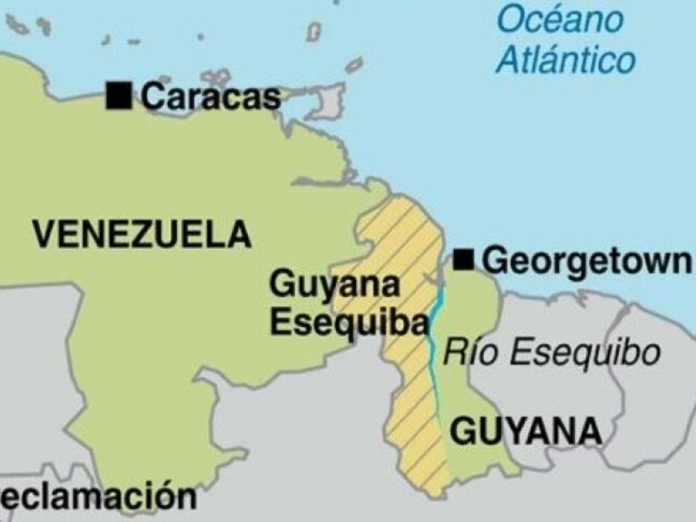
by STAFF WRITER
ROSEAU, Dominica, Oct 3, CMC – Venezuelan President, Nicolás Maduro, last week held discussions with several Caribbean Community (CARICOM) leaders on his country’s border dispute with Guyana, Dominica’s Prime Minister Roosevelt Skerrit confirmed on Tuesday.
Skerrit, who is also chairman of the 15-member regional integration grouping of which Guyana is a member, told a news conference that the talks were held in Grenada on the sidelines of the two-day second Caribbean Small Island Developing States (SIDS) High-Level Dialogue on Climate Change.
Media reports said that apart from Skerrit, the regional leaders present were Barbados Prime Minister Mia Mottley, her St. Vincent and the Grenadines counterpart Dr. Ralph Gonsalves, the Prime Minister of St. Kitts-Nevis and the host Prime Minister Dickon Mitchell.
“Well, the meeting was with the Executive Vice President of Venezuela (Delcy Eloina Rodriguez), the highest Venezuelan official present at the meeting, and also the Foreign Minister of Venezuela (Yvan Gil Pinto) along with several of the prime ministers from the Caribbean Community and also we had a telephone engagement with the President of Venezuela,” Skerrit told reporters.
“The main point of discussion had to do with the border dispute between Venezuela and Guyana. These are two sisterly nations within the Caribbean space, both of which we all have excellent relations with, and what we always do as a CARICOM grouping is to seek to use our good offices to help member states resolve issues among themselves in an amicable manner.”
Skerrit said that ultimately the border dispute between the two countries “is a matter for these two nations, but we were using our good offices to ensure that while the issue is being addressed we can maintain good relations among ourselves.
“We felt it was a constructive engagement. We were very transparent with the government of Venezuela and they were also very transparent with us …and so we are using our good offices to seek some better understanding between the two countries on this long-standing border issue,” Skerrit said.
The meeting in Grenada came amid a controversy sparked by a decision on September 21 by Venezuela’s “National Assembly” to unanimously agree to call a National Public Consultation “so that the people strengthen the defense” and “the inalienable rights of Venezuela” over the territorial dispute with Guyana.
Last month, the Irfaan Ali administration announced that it had received bids for eight of the country’s oil blocks which are located offshore Guyana.
But in a statement, the Maduro government rejected the auction saying “The Bolivarian Republic of Venezuela, strongly rejects the illegal bidding round for oil blocks currently carried out by the Government of the Cooperative Republic of Guyana (Blocks for tender for 2022 – Guyana Licensing Round), since it intends to have maritime areas pending delimitation between the two countries”.
In its statement, Caracas also noted that any arbitrary concession granted would be “unacceptable” and that “these actions do not generate any type of rights to third parties who participate in such a process.”
Last week, the General Secretariat of the Organization of American States (OAS) said it objected to Venezuela’s encroachment on Guyana’s “sovereignty and territorial rights through intimidatory,” and called on Caracas to await the ruling by the International Court of Justice (ICJ) on the border dispute.
The Commonwealth Ministerial Group on Guyana has also criticized the position on Venezuela, reaffirming its unwavering support for the judicial process underway before the ICJ “and reiterated its firm and steadfast support for the maintenance and preservation of the sovereignty and territorial integrity of Guyana, and the unobstructed exercise of its rights to develop the entirety of its territory for the benefit of its people”.
Guyana instituted proceedings against Venezuela by Application to the ICJ on March 29, 2018, asking the Court to resolve the controversy that has arisen as a result of Venezuela’s contention, formally asserted for the first time in 1962, that the 1899 Arbitral Award Regarding the Boundary between the Colony of British Guiana and the United States of Venezuela is “null and void”.
“The Government of the Cooperative Republic of Guyana remains firmly of the view that the Arbitral Award of 1899 is valid. Guyana is committed to a path of final and peaceful settlement and will continue to adhere to the rule of International Law and the procedures of the International Court of Justice.
“It is for honour that we call today as we celebrate on this anniversary date that Arbitral Award of Paris of 3rd October 1899 in continued respect for the sanctity of Treaties and the rule of law,” the Guyana government statement noted on Tuesday.
CMC/pr/ir/2023

